
The teaching enrichment cluster is an ‘innovation powerhouse’ comprised of teaching support colleagues from multiple units, including colleagues from Technology-Enriched Learning Initiative (TELI) and 4 colleagues from the Faculty of Education, Architecture and Law. The cluster support teachers in revamping teaching and learning with innovative strategies and technologies, and offer services including instructional design, technology adoption, system development and big data analytics. To be specific, we provide responsive pedagogical and technical consultancies as well as development services to the Faculties and teachers in developing and implementing e-learning, presence learning and blended learning. Colleagues strive to create quality-time (e.g. learning support beyond classroom) and quality-space (e.g. engaging in-class activities) for teachers and students with the help of technology.
In this blog post series, we will introduce colleagues’ key initiatives in the 2018-2019 academic year in terms of pedagogical development and system development.
We Aim to Establish Strong Links to Stakeholders
We see the high value of partnerships in driving teaching innovations. We aim to facilitate inter-disciplinary and cross-Faculty collaboration on education development which can make a greater impact on student learning. We worked side-by-side with teachers from different disciplines, thereby spreading the enthusiasm, discovering new perspectives in teaching development, and cultivating a new T&L culture.
Facilitating Sharing of Contents and School Credits across Universities
In the past, there were limited chances to experiment with the cross-institutional credit transfer mechanism. Yet, colleagues in the cluster have worked hard in overcoming this challenge and initiated a UGC-funded cross-institutional project titled “The Responsive University: Appreciating Content Sharing in General Education” in collaboration with PolyU, CUHK and HKUST. In particular, colleagues have engaged teachers and stakeholders to develop cross-institutional General Education/Common Core courses with innovative blended curriculum. In the 2018-19 academic year, a total of 10 shared courses from four different Hong Kong institutions were offered, and a total of 127 students joined the project. In this joint project, the four universities have also entered into an Agreement for Collaboration, under which eligible students in the participating institutions can enrol in one of the selected courses offered by other partner institutions respectively.

Teaching-Development Partnership for Introducing Mobile-Friendly Learning and Community Outreach
More often than not, teachers are not familiar with technical specifications of the process of developing educational solutions that bring about unsuitable learning strategies. During the academic year 2018-2019, we have worked collaboratively with colleagues from the School of Nursing to share the innovative pedagogical and technological solutions and seek out the potentials for immersive learning and community outreach.
The use of virtual reality (VR) and extended reality (XR) technologies can create experiences that educate, engage, and excite learners. A VR-based app on dementia care was developed to cultivate nursing students’ clinical reasoning and clinical judgement in flipped classes in the University, such that students can experience situations that simulate the actual environments for medical training. Instead of advising disciplinary knowledge, we focus on creating a learner-relevant, effective and immersive learning experience, leveraging our expertise on user experience (UX), media design, system architecture and technical development.
Besides teaching and learning inside the classroom, we worked together to develop technologies for promoting tobacco control, HPV vaccination, and alcohol control. For example, we worked with teachers to develop mobile apps, AI-enabled chatbots and ecological momentary assessments supporting smoking cessation through different interventions. We also developed a simulation game to promote HPV vaccination for secondary school students.
We Aim to Show Great Enthusiasm for Continuous Improvements
Talents are important resources for a sustainable cluster development. Cultivating talents is crucial to stay responsive to the fast-changing needs of the University. Colleagues in the cluster are of diverse backgrounds coming from different countries/cities (including Uzbekistan, Egypt, Indonesia, Pakistan, Malaysia, Taiwan, Mainland China and Hong Kong), and with different expertise (e.g. psychology, language, information technology, etc.). Therefore, we often organize activities to provide opportunities for colleagues to learn from each other, as well as to build up trust and team spirit for a more cohesive cluster. We continuously help colleagues to expand their capabilities and adopt data-informed/closed-loop development for delivering wider and better educational development services.
Cross-Disciplinary Hackathon
Colleagues from different fields teamed up and attended a half-day internal Hackathon. The event was for brainstorming proof-of-concept solutions to existing issues in e-learning within higher education (e.g. AI-powered teaching-student interaction app). At the end of the Hackathon, colleagues were required to give a presentation with a mock-up. Colleagues, coming from different fields and have not had worked together, now have the opportunity to collaborate closely and come up with effective solutions (e.g. EdTech apps).
Internal and External Professional Development Events
Colleagues are encouraged to attend technical and pedagogical training for mastering their skills that will accelerate their professional growth. For example, one of our colleagues had attended a one-week professional training at Harvard University, which aims to train educators in developing a design thinking mindset. She applied what she has learned in a mobile game app project for a Common Core course to further enhance the pedagogical value of the project. A couple of other colleagues have also been given the chance to attend an internal training course on teaching and learning in higher education. They have successfully completed the course and have a deeper understanding of in-class teaching and learning activities in the University. Besides attending external and internal training, there are also cross-disciplinary seminars. For example, multimedia colleagues were invited to introduce cutting-edge computer graphics and interactive technologies, and external researchers were also welcomed to talk about teaching development and evaluation practices. These seminars help to broaden colleagues’ horizons and inspire new ways of implementing teaching and learning.
Adopting Data-Informed/Closed-Loop Development
We constantly review and revamp our solution and development process through conducting stakeholder surveys and focus group interviews in projects. In particular, the cluster evaluated the quality of various technology-enriched pedagogies used in on-campus blended courses and generated insights to develop better pedagogical practices. Based on the findings, colleagues provide continuous assistance to teachers on creating new educational videos, collaborative classwork and assessment as well as revamping the existing ones for more effective teaching. Besides redesigning pedagogical practices, we have studied students’ motivations and expectations in participating in a cross-institutional teaching and learning initiative through qualitative and quantitative means. The findings of the study highlight some of the concerns and needs of students, and based on these, we have designed new posters and videos addressing their needs and concerns to promote this initiative. As a result, more students are aware of the initiative and more than 100 students are joining it now.








